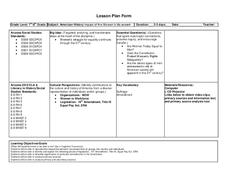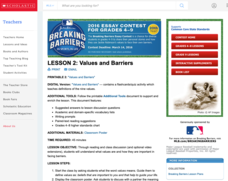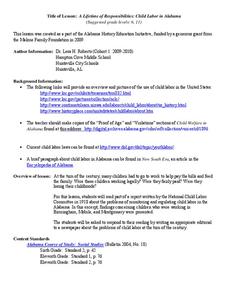Youth Leadership Initiative
Selecting a President: Primaries and Caucuses
What is a party caucus anyway? And what part do caucuses play in the primaries? Everything future voters need to know about the four stages in the presidential selection process is provided by this resource. The 2012 US Presidential...
School Improvement in Maryland
Affirmative Action
Do the government's affirmative action policies promote equity in the United States? The Fourteenth Amendment to the US Constitution and affirmative action policies come under scrutiny in an activity that asks class members to...
School Improvement in Maryland
Evaluating Political Advertisements
How do interest groups try to influence elections? As part of their study of the election process, groups view 30-second advertisements produced by advocacy groups and use the provided worksheet to evaluate these ads. They then craft...
Arizona Department of Education
American History Impact of the Women’s Movement
Take a look at important images that depict the women's suffrage movement, the support for the Equal Rights Amendment, and wage equity for women over the last two centuries. As class members work through a lesson on primary source...
James Madison Memorial Fellowship Foundation
Those "Other Rights:" The Constitution and Slavery
Did the United States Constitution uphold the institution of slavery, or did it help to destroy it? Young historians study Article 4, Section 2, Clause 3 of the Constitution and evaluate the rights of slaveowners as they compared to or...
Curated OER
Woodrow The White House Mouse
Inauguration Day is January 20. Implement an entire week's worth of mini activities to help young historians become knowledgeable of the President's job, the executive branch, and the White House. The worksheets focus on research skills,...
Advocates for Human Rights
Refugees and Asylum Seekers
To gain a deeper understanding of the plight of refugees and asylum seekers, class members read stories written from the point of view of an emigrant, map the individual's journey, and note the human rights affected by each stage of the...
State Bar of Texas
Roe v. Wade
At what point does the right of privacy end and the government begin? Scholars research rights under the Ninth Amendment to the Constitution. Using the 1973 Roe v. Wade Supreme Court case as a starting point, along with small group work...
State Bar of Texas
Texas v. Johnson
If you saw a person burning an American flag, how would you feel? Scholars analyze the concept of freedom of expression and speech with the Supreme Court case Texas v. Johnson. A short video clip creates open discussion in pairs on the...
State Bar of Texas
Mendez v. Westminster and Delgado v. Bastrop ISD
You arrive at school only to be told you have no place there. Scholars research the Supreme Court cases Mendez v. Westminster and Delgado v. Bastrop ISD, both dealing with school segregation. Two short video clips as well as small group...
State Bar of Texas
Gideon v. Wainwright
How does a trial begin without a lawyer for the defendant? The 1963 Supreme Court case Gideon v. Wainwright serves as the backdrop for the study of the rights of the accused. Scholars use a short video along with paired discussion and...
Scholastic
Lesson 2: Values and Barriers
Scholars investigate and discuss the importance of values and how they can be used to break barriers. Small groups work collaboratively to examine the text and draw inferences to answer questions. A writing assignment challenges pupils...
Teaching American History
Interpretation of the Declaration of Independence
Ready to interpret the Declaration of Independence and understand its meaning? The resource divides scholars into pairs, where they work as a team to match translations with excerpts from the declaration. The class then engages in...
Curated OER
Jimmy Carter: Civic Action, Lesson 2
Build on high schoolers' awareness of what's wrong with society. Here they examine Jimmy Carter's extensive involvement in volunteer action in the local, national, and global arenas. Define and explore concepts -- philanthropy, citizen,...
Curated OER
Cooperative Learning Units
Groups of learners work cooperatively to perform research, and compile a presentation for the class on a selected Nevada Indian Tribes. Some of the topics researched are territorial movements, religion, social life, recreation, and food...
BBC
Words in the News
Here's an "old-school" lesson plan on an event in US history. High schoolers look into the massive layoffs that occurred in New Orleans in 2005. Discussion and debate take place, and groups of learners must cut and paste a series of...
Middle Tennessee State University
Who's Afraid of the Big Bad Wolf? A Comparison in American Culture
As part of their study of the Progressive Era, class groups examine a 20th century version of "The Three Little Pigs" through a New Era lens and identify how ideals such as the value of hard work, creativity, and problem solving, etc.,...
9/11 Memorial & Museum
The Destruction and Rebuilding of the World Trade Center
How did an investigation into the causes of the collapse of the Twin Towers, as a result of the 9/11 attacks, inform the construction of the new 1 World Trade Center? That is the central question of a resource that asks class members...
Alabama Department of Archives and History
A Lifetime of Responsibilities: Child Labor in Alabama
Imagine children working long hours in factories, coal mines, and in the fields. Class members examine a series of pictures and read about early attempts to regulate child labor and current child labor laws.
Alabama Department of Archives and History
Alabama BEFORE the American Revolution
Did you know that prior to the American Revolution, Alabama was a part of the British empire and called New West Florida? Class members research the economic, political, and social realities of this territory and compare them to those of...
Alabama Department of Archives and History
Alabama Tenant Farmers and Sharecroppers, 1865 to Present
The tenant farming and sharecropping systems that developed in the South after the Civil War, the reasons for their development, and the eventual decline of these systems are the focus of this two-day plan.
Alabama Department of Archives and History
Alabama's 1901 Constitution
"We, the People of the State of Alabama. . ." Did you know that the Alabama State Constitution has 357,157 words while the US Constitution has only 4,400? And that it has 798 amendments while the US Constitution has 27? Class groups...
Alabama Department of Archives and History
Alabama's Secession in 1861: Embraced with Joy and Great Confidence. Why?
From December 20, 1860 to June 8, 1861, eleven states seceded from the Union. Alabama seceded on January 11, 1861. Why did so many white Alabamians want to secede? Why did they believe the South could win the war? These are the essential...
Alabama Department of Archives and History
New York Times Co. v Sullivan: The Alabama Case that Changed Libel Law
Malice aforethought? Can the New York Times be held libel for false claims appearing in its ads? The Supreme Court case New York Times v Sullivan changed the interpretation of the First Amendment. Class members examine these changes and...
Other popular searches
- Student Teacher Observation
- Student Teacher Cpr
- Student Teacher Relation
- Student Teacher Lesson Plans
- Student Teacher Reports
- Student Teacher Relationship
- Student Teacher Technique
- Student Teacher Japan
- Student Teacher 92625
- Mentoring Student Teachers

























